- With standard equipment
- With safety pack
Find more information in the General Comments section of the assessment
Find more information in the Rating Validity tab of the assessment
- See More
- See More
- See More
- See More
- Good
- Adequate
- Marginal
- Weak
- Poor
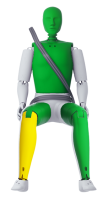 Passenger
Passenger
 Driver
Driver
 Rear Passenger
Rear Passenger
 Driver
Driver
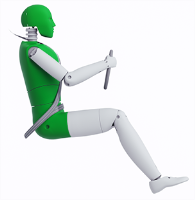 Car
Car
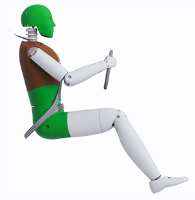 Pole
Pole
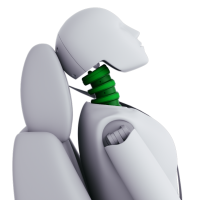 Rear Seat
Rear Seat
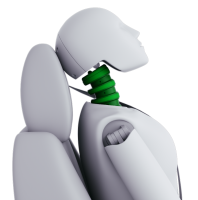 Front Seat
Front Seat
- Good
- Adequate
- Marginal
- Weak
- Poor
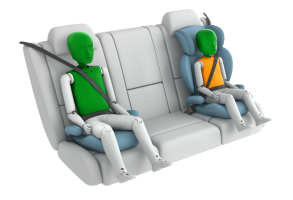

Passenger
outboard
center
Fitted to the vehicle as standard
Not fitted to the test vehicle but available as option
Not Available
-
i-Size CRS
-
ISOFIX CRS
-
Universal Belted CRS
Easy
Difficult
Safety critical
Not allowed
| Seat Position | ||||
|---|---|---|---|---|
| Front | 2nd row | |||
| Passenger | Left | center | Right | |
| Maxi Cosi 2way Pearl & 2wayFix (rearward) (iSize) | ||||
| Maxi Cosi 2way Pearl & 2wayFix (forward) (iSize) | ||||
| BeSafe iZi Kid X1 i-Size (iSize) | ||||
| Maxi Cosi Cabriofix & FamilyFix (ISOFIX) | ||||
| BeSafe iZi Kid X3 ISOfix (ISOFIX) | ||||
| Britax Römer Duo Plus (ISOFIX) | ||||
| Britax Römer KidFix XP (ISOFIX) | ||||
| Maxi Cosi Cabriofix (Belt) | ||||
| Maxi Cosi Cabriofix & EasyBase2 (Belt) | ||||
| Britax Römer King II LS (Belt) | ||||
| Britax Römer KidFix XP (Belt) | ||||
Easy
Difficult
Safety critical
Not allowed
In the frontal offset test, the Prius showed good protection of all body areas for the10 year dummy, and all apart from the chest for the 6 year dummy. Chest accelerations were marginally elevated for the 6 year old's chest. In the side impact, maximum points were scored for both the 6 and the 10 year dummy, with good protection of all critical body areas. The front passenger airbag can be disabled to allow a rearward-facing child restraint to be used in that seating position. Clear information is provided to the driver regarding the status of the airbag and the system was rewarded.
- Good
- Adequate
- Marginal
- Weak
- Poor
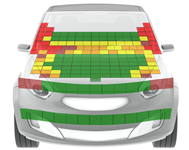
Head Impact 16.9 Pts
Pelvis Impact 4.8 Pts
Leg Impact 6.0 Pts
| System Name | Pre-Collision System with Pedestrian Detection as a part of Toyota Safety Sense | ||
| Type | Auto-Brake with Forward Collision Warning | ||
| Operational From | 10 km/h | ||
| Additional Information | Defaults on for every journey; operates above 40km/h and in low ambient light | ||
| PERFORMANCE | | |||
| Autobrake Function | |||
| Avoidance | Mitigation | ||
|
Running Adult crossing from Farside
|
Collision avoided up to 60 km/h | ||
|
Walking Adult crossing from Nearside -25%
|
Collision avoided up to 40 km/h | Impact mitigated up to 60 km/h | |
|
Walking Adult crossing from Nearside -75%
|
Collision avoided up to 60 km/h | ||
|
Running Child from behind parked vehicles
|
Collision avoided up to 20 km/h | Impact mitigated up to 40 km/h | |
The protection offered by the bonnet to the head of a struck pedestrian was predominantly good or adequate with poor results recorded only at the base of the windscreen and on the stiff windscreen pillars. The bumper scored maximum points, with good results at all test locations. Protection of the pelvis was mostly good with some areas of weak protection at the outboard edges. The Prius's autonomous emergency braking system is able to detect pedestrians. In Euro NCAP's tests, the system performed well, managing to avoid a collision or mitigate the severity in the great majority of cases.
- Good
- Adequate
- Marginal
- Weak
- Poor
| System Name | Road Sign Assist as a part of Toyota Safety Sense |
| Speed Limit Information Function | Camera based, subsigns supported |
| Warning Function | Manually set |
| Speed Limitation Function | Manually set (accurate to 5km/h) |
| Applies To | All seats | ||
| Warning | Driver Seat | Front Passenger(s) | Rear Passenger(s) |
| Visual | |||
| Audible | |||
|
|||
| System Name | Lane Departure Alert with Steering Control as a part of Toyota Safety Sense |
| Type | Lane Keep Assist and Lane Departure Warning |
| Operational From | 50 km/h |
| Warning | Audible |
| Performance | |
|
LKA Confirmation Test
|
Pass (4/5) |
|
LDW Confirmation Test
|
Pass |
| System Name | Pre-Collision System with Pedestrian Detection as a part of Toyota Safety Sense | |||
| Type | Forward Collision Warning with Auto-Brake | |||
| Operational From | 10 km/h | |||
| Additional Information | Default On | |||
| Performance | | ||||
| Autobrake Function Only | Driver reacts to warning | |||
| Operational Speed | 10-180 km/h | 10-180 km/h | ||
| Approaching a stationary car | See AEB City | Crash avoided up to 80km/h. | ||
| Approaching a slower moving car | Crash avoided up to 70km/h. | Crash avoided up to 80km/h. | ||
| Following a car at short distance | ||||
| Car in front brakes gently | Avoidance | Avoidance | ||
| Car in front brakes harshly | Avoidance | Avoidance | ||
| Following a car at long distance | ||||
| Car in front brakes gently | Avoidance | Avoidance | ||
| Car in front brakes harshly | Avoidance | Avoidance | ||
Toyota Safety Sense is standard equipment. It includes an autonomous braking system which operates at highway speeds and showed good performance in Euro NCAP's tests; a lane assistance system which warns the driver if he is drifting out of lane, and helps to correct the departure; and a camera-based speed assistance system which informs the driver of the appropriate limit, allowing him to set the speed limiter as appropriate.
- Specifications
- Safety Equipment
- Videos
- Rating Validity
Specifications
Tested Model Prius Hybrid
Body Type 5 door hatchback
Year Of Publication 2016
Kerb Weight 1387kg
VIN From Which Rating Applies - all Prius
Class Large Family Car
Safety Equipment
Note: Other equipment may be available on the vehicle but was not considered in the test year.
Fitted to the vehicle as standard
Fitted to the vehicle as part of the safety pack
Not fitted to the test vehicle but available as option or as part of the safety pack
Not available
Not applicable
Videos
Rating Validity




Find more information in the General Comments section of the assessment
 Share
Share
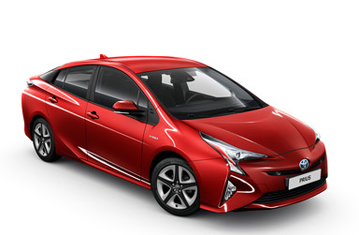




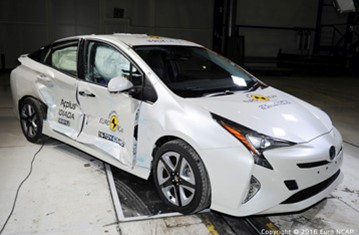





The passenger compartment of the Prius remained stable in the frontal offset test. Dummy readings showed good protection of the knees and femurs of the driver and passenger. Toyota showed that a similar level of protection would be provided to occupants of different sizes and to those sat in different positions. Driver chest protection was rated as marginal, based on dummy readings of compression In the full-width rigid barrier frontal impact, protection of both the driver and rear passenger dummies was rated as good, except for the chest, protection of which was adequate. In the side barrier test, the Prius scored maximum points with good protection of all critical body areas. However, in the more severe side pole test, dummy readings of lateral rib compression indicated weak protection for the chest, all other body areas being well protected. The front seats and head restraints demonstrated good protection against whiplash injury in the event of a rear-end collision and a geometric assessment of the rear seats also indicated protection for those occupants. The Prius is equipped as standard with Toyota Safety Sense which includes a low speed autonomous braking system. Euro NCAP's tests revealed good performance of that system, the car scoring maximum points.